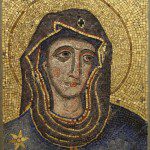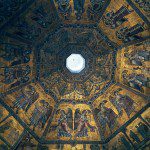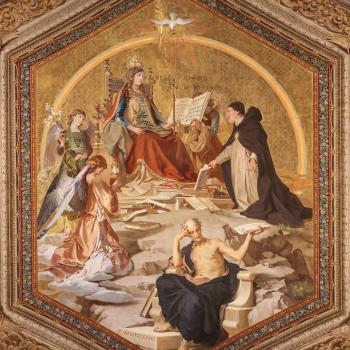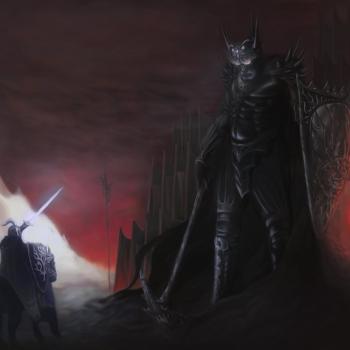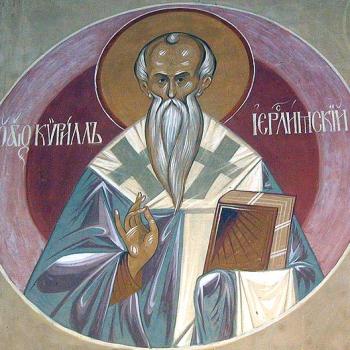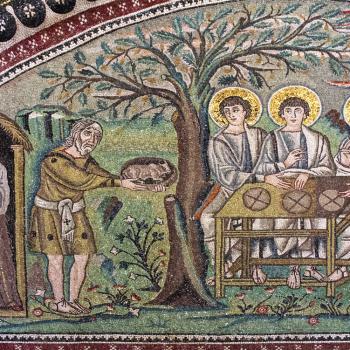St. Augustine believed that God created the order of angels to exist in a perfect harmonic balance with one another which was subsequently lost due to the fall of Satan (and those who followed Satan in his rebellion). This showed the tragedy which developed as a result of Satan’s rebellion. Not only did the fallen angels suffer from their turn away from God, in ways which we probably cannot understand because we are not pure spirits like they, but the angelic order was wounded, as its intended internal order was turned into disorder. Their interdependent relationship which formed an integrated whole suffered loss because a portion of that whole was cut out from within, like a cancer cut out from an otherwise healthy body. The damage had been done. While the angelic choir continued to exist, what was excised from it had left its mark, and the beauty seen and experienced through the original angelic harmony had been diminished, though not entirely lost. The solution to this problem, suggested St. Augustine, was to see how those fallen angels could be, and would be, replaced by humans:
And so it pleased God, the Creator and Governor of the universe, that, since the whole body of the angels had not fallen into rebellion, the part of them which had fallen should remain in perdition eternally, and that the other part, which had in the rebellion remained steadfastly loyal, should rejoice in the sure and certain knowledge of their eternal happiness; but that, on the other hand, mankind, who constituted the remainder of the intelligent creation, having perished without exception under sin, both original and actual, and the consequent punishments, should be in part restored, and should fill up the gap which the rebellion and fall of the devils had left in the company of the angels. For this is the promise to the saints, that at the resurrection they shall be equal to the angels of God. And thus the Jerusalem which is above, which is the mother of us all, the city of God, shall not be spoiled of any of the number of her citizens, shall perhaps reign over even a more abundant population.[1]
Augustine, and others like him, understood that this could seem to suggest that the number of the saved would be limited to the number of angels who fell , and so wrote to make sure that such a conclusion would not be made. Humans more than made up for the fallen angels; they brought a bounty of their own. [2] St. Anselm put it succinctly: “Moreover, there will be more elect than sinful angels, and thus we shall say that human beings were not created solely for the restoration of the number which has been depleted, but also to make up a number which was not yet complete.”[3] This helped prevent a deterministic understanding to salvation that would limit the number of the saved merely to the number of the angels which fell. Humans were made to have their own place in the eschatological kingdom of heaven, and were not mere replacements for fallen angels. But because of what God had done in and with humanity in the incarnation, they could and would find themselves lifted up into the heavenly hierarchy so that some could serve in positions left vacant by fallen angels.
But what exactly does it mean for humans to replace fallen angels? Is it an interesting idea which has no practical implication, and so leads itself to be a theological dream which leaves those engaging it to be lost in heavenly clouds? Or are there real implications of this which help bring the theologian back down to earth?
A possible answer to this question emerges when we consider what exactly angels are and what exactly they are said to do. For if humans are to replace fallen angels in the kingdom of heaven, is it not best to think anyone who replaces an angel does more than take over and sit in the position of such a fallen angel, doing nothing but looking nice in the choir of angels, but rather actually doing what the fallen angel was intended to do?
Traditionally angels were seen as pure intellects, spirits which minister to God in loving obedience while serving as mediators between God and creation, acting as messengers (angel, άγγελος) of God to the world. The term angel represents this mediating work they do. As Pseudo-Dionysius explained, even the highest orders of such spirit are called angels, even if they have other names, because they mediate God’s truth to the rest of creation: “Theologians give the name ‘angel’ also to the highest orders of heavenly beings by virtue of the fact that they too make known the enlightenment preceding from the Deity.”[4] And yet what angels do is more than to serve God as messengers of truth; they are the invisible spiritual principles which lie behind the world order, and so in a way, have precedence over the physical world. St. Basil explained that their existence, because it is spiritual and not material, must be seen as prior to material existence:
The birth of the world was preceded by a condition of things suitable for the exercise of supernatural powers, outstripping the limits of time, eternal and infinite. The Creator and Demiurge of the universe perfected His works in it, spiritual light for the happiness of all who love the Lord, intellectual and invisible natures, all the orderly arrangement of pure intelligences who are beyond the reach of our mind and of whom we cannot even discover the names. They fill the essence of this invisible world, as Paul teaches us. “For by him were all things created that are in heaven, and that are in earth, visible and invisible whether they be thrones or dominions or principalities or powers” or virtues or hosts of angels or the dignities of archangels.[5]
They are the spiritual principles which rule over material creation so that each spiritual being, each angelic being, can be seen as ruling or governing elements of the material world, elements which take on or incorporate the metaphysical principles the angelic beings represent. They can, as St. Clement of Alexandria suggested, use their power and authority for our own good:
Thus, then, the benefit that comes from God to men becomes known— angels at the same time lending encouragement. For by angels, whether seen or not, the divine power bestows good things. Such was the mode adopted in the advent of the Lord. And sometimes also the power “breathes” in men’s thoughts and reasonings, and “puts in” their hearts “strength” and a keener perception, and furnishes “prowess” and “boldness of alacrity” both for researches and deeds.[6]
Likewise, when dealing with the fallen powers of the air, fallen spiritual principalities, we find they can and do seek us harm: “And some say that plagues, and hail-storms, and tempests, and the like, are wont to take place, not alone in consequence of material disturbance, but also through anger of demons and bad angels.”[7] It is not that the world does not follow its own natural principles, but rather the natural principles themselves are connected to the spiritual, non-material or metaphysical order which the natural principles follow. We find that those spiritual principles come out of and emerge from the whole of the spiritual world which precedes material creation, the spiritual world which is full of fallen beings, and so the spiritual world which lies behind the material world leads to a disordered material world. The natural order is fallen because the principles behind the natural order, the spiritual realities behind nature, are fallen.
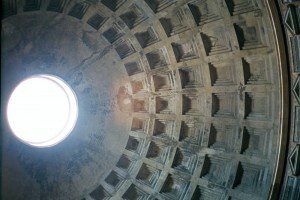
Sergius Bulgakov, in exploring the meaning behind angels and the spiritual hierarchy which they form, suggested that we consider how they are represented in the vision of “Jacob’s Ladder” as a means of understanding them. They were not all found on the same level of hierarchy of being, but exist on different “rungs” of the ladder, on different levels of the great chain of being, with some greater than others, and yet the ladder shows how they connect to the material world and guide it. Bulgakov believed that this ladder was intuited by Plato in his philosophical speculation and served as the foundation for his philosophy of the forms: “Platonic ideas are in reality angels of the Word, and Plato’s sagacity, which compels us to recognize him as ‘A Christian before Christ’ (according to ecclesiastical literature) is that he recognized the necessity of grounding the earthly world in the heavenly, becoming in being, things in ideas.”[8] But, understanding these principles to be angels, we learn something more about these Platonic forms or ideas. They are not just impersonal forces, rather they are hypostasized spiritual principles which come out of and flow from the Word of God, the Logos:
Paganism, in its elemental clairvoyance, knew the heavenly foundation of the universe, but in its blindness it equated the angelic hierarchies with gods, or more precisely, the gods, “sons of God” (Job 1:6; 2:1), with the very God. The Christian sense and truth of Platonism is disclosed only in angelology as the doctrine about heaven and earth in their interrelations. Platonic ideas encompass everything themselves, and this is the ontology of the world. But these ideas exist not as logical abstractions and schemes of things, but as hypostatic essences, as angels of the Word.[9]
Angels, the spiritual principles which rule over creation, were called gods, not just by pagans but by the Jews. “God has taken his place in the divine council; in the midst of the gods he holds judgment” (Ps. 82:1 RSV). For this reason, St. Augustine had no problem with the term god being used for them, so long as we understood it was a relative or conventional term, and we do not confuse them for the One God, the creator beyond all creation:
If the Platonists prefer to call these angels gods rather than demons, and to reckon them with those whom Plato, their founder and master, maintains were created by the supreme God, they are welcome to do so, for I will not spend strength in fighting about words. For if they say that these beings are immortal, and yet created by the supreme God, blessed but by cleaving to their Creator and not by their own power, they say what we say, whatever name they call these beings by.[10]
As spiritual principles which ruled over the world, angels were experienced as the “gods” which ruled over nature. The pagan intuition was based upon some elements of truth, though the pagans lost themselves in the intuition as though it encompassed the whole of the truth. This explains how and why their proper respect to the spiritual powers which lay behind the world led to a practical ignorance of the One who was beyond all the spiritual powers they worshiped. Angels served as national protectors (like Michael for Israel); they helped govern and rule over humanity, preparing humanity for the coming of Christ, where we would hopefully become spiritually mature and able to govern and direct ourselves. [11] It was right to respect and honor these beings, to thank them for their guardianship, if they did so out of obedience to God, as St. Bernard of Clairvaux stated:
Yet as true as it is that God alone has given the angels the charge it is nevertheless necessary to be thankful to them who obey God with such great charity and who come to our aid in our great need. Therefore, we are devoted to them, we are thankful for such great guardians. Let us return love to them, let us honor them as much as we able and as much as we ought.[12]
Such thanks had to be the right kind, and the beings which were thanked had to be the right ones. Sadly, in human history, many fallen powers were confused as to be good, and were worshiped and thanked when they should have been denounced and rejected. Since many of the spiritual principles behind creation, many of the angelic beings were fallen, the powers they held over the world remained but were used for evil. Such fallen spirits either took out their rage on humanity and attacked it directly, causing various “natural” disasters in human history, or they directed their hate to harm humanity in spirit, to misdirect humanity so that such evil spirits were taken in as among the gods which needed to be honored and respected (or often, they did both). Not only was pre-Christian humanity confused in relation to the nature of the spiritual principles which lie behind creation, they did not entirely understand that many of those same principles were fallen and needed to be avoided and overturned. The material world, which the spiritual powers of creation fought against each other, good angels over fallen angels for the fate of humanity, was the order which humanity itself came to know as the “higher order” behind the world, and so the good and the bad were mistakenly worshiped together as the “gods” of the world. “The ancients in their immediacy heard angels, knew their presence, and expressed this knowledge in the general conviction that panta plere theon – everything is filled with gods, i.e., with personal manifestations of divine power, the angels of God.” [13] The world was full of gods, full of angelic powers, but the order which connected them together, and the higher God over all of them, for the most part was not known.
To be continued
[1] St. Augustine, Enchiridion in NPNF1(3):247.
[2] “It is He who when He foreknew that man would in his turn sin by abandoning God and breaking His law, did not deprive him of the power of free-will, because He at the same time foresaw what good He Himself would bring out of the evil, and how from this mortal race, deservedly and justly condemned, He would by His grace collect, as now He does, a people so numerous, that He thus fills up and repairs the blank made by the fallen angels, and that thus that beloved and heavenly city is not defrauded of the full number of its citizens, but perhaps may even rejoice in a still more overflowing population,” St. Augustine, City of God in NPNF1(2): 480 [ XXII.1].
[3] St. Anselm, Why God Became Man in Anselm of Canterbury: The Major Works. trans. Janet Fairweather. ed. and intr. Brian Davies and G. R. Evans (Oxford: Oxford University Press, 1998), 292.
[4] Pseudo-Dionysius, “The Celestial Hierarchy” in Pseudo-Dionysius. The Complete Works. trans. Colm Luibheid (New York: Paulist Press,1987), 159.
[5] St. Basil, Hexaemeron in NPNF2(8): 54.
[6] St. Clement of Alexandria, Stromata in ANF(2):518.
[7] St. Clement of Alexandria, Stromata in ANF(2):487. In this passage he is talking about Greek philosophy and thought and why Greeks sought to appease the demons, and yet behind it is a theory which he does not entirely deny and that theory is helpful in our exploration here.
[8] Sergius Bulgakov, Jacob’s Ladder: On Angels. trans. Thomas Allen Smith (Grand Rapids, MI: William B. Eerdman’s Publishing Co., 2010), 83.
[9] Sergius Bulgakov, Jacob’s Ladder, 83.
[10] St. Augustine, City of God in NPNF1(2):178. [IX.23].
[11] Marsilio Ficino saw an echo of this in the works of Plato, and so commenting upon Plato’s theories of the state, Ficino explained, “The mystery may be explained in another way: from the beginning of the world, or immediately after the Flood, uncultivated men were governed by the divine providence of angels our by the ministrations of the better daemons until the time when, gradually acquiring more experience, they were able to govern themselves. But it is consistent with reason that men are governed more properly and more profitably by higher beings than themselves,” Marsilo Ficino, Commentary on the Laws in When Philosophers Rule: Ficino’s On Plato’s Republic, Laws, & Epinomis. trans. Arthur Farndell (London: Shepherd-Walwyn, 2009), 96. The “mystery” being related to here is to why Plato talked about humans being ruled by daemons.
[12] St. Bernard of Clairvaux “Sermons on Psalm 90. Sermon Twelve” in Angelic Spirituality: Medieval Perspectives on the Ways of Angels. trans. Steven Chase (New York: Paulist Press, 2002), 117.
[13] Sergius Bulgakov, Jacob’s Ladder,26.
Stay in touch! Like A Little Bit of Nothing on Facebook:
A Little Bit of Nothing


